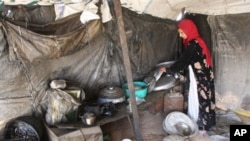The World Food Program is employing more than 11,000 of the most vulnerable people in Iraq in a cash-for-work program aimed at helping them get enough food to eat. This is an expansion of a pilot scheme WFP started in the Diyala and Baghdad governorates earlier this year.
More than seven years after U.S. forces invaded Iraq, many people are still going hungry. A 2008 survey finds almost one million people in the country are short of food. And, a further 6.4 million people would be at risk of food insecurity without assistance from the Public Distribution System.
It is this grim reality that prompted the World Food Program to begin its cash-for-work program earlier this year in some of the areas most affected by violence and insecurity.
WFP spokeswoman, Emilia Casella, says the program is targeting more than 11,000 of the most vulnerable people, including internally displaced people and returnees.
She says participants are paid the Iraqi dinar equivalent of $10 a day for a three-month period. Supervisors, she says are paid $13 a day.
"This pay rate is slightly under what the average daily wage is in these communities and that is because we want to make sure that these are jobs that are done or obtained by the very most vulnerable people who might be shut out of the labor force in other ways because they are displaced people, people who may have just newly returned to their communities. So, it is not a high wage, but it is a wage aimed at getting to heads of households who may be otherwise completely unemployed," said Casella.
The scheme provides beneficiaries with short-term employment in agricultural infrastructure projects.
WFP says the scheme works well in a country such as Iraq where food is available in the markets, but people cannot afford to buy it.
Casella says the communities themselves select the cash-for-work activities, according to their priorities. "Some of the work that they are doing is tree planting. Some is clearing irrigation canals, rehabilitating farmland, improving sanitation and also improving or rehabilitating sewage systems, many of which have been either destroyed or degraded over years, including by the conflict," she said.
While cash-for-work helps the immediate family of the worker, Casella says the scheme also helps to support the local economy. She says unlike operations that distribute food directly to the needy, those who are part of cash-for-work can spend their money for food or other necessities in the local market.
She says a $5 million grant from the United State government has allowed it to expand the program.
Vulnerable Benefit From Cash-For-Work Program in Iraq




